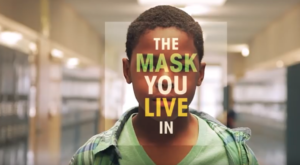Miss Representation and The Mask You Live In

“Miss Representation” and “The Mask You Live In” are two documentaries that deal with the very important topics of how we socialize girls and boys. Each one focuses on one gender and highlights the massive impacts that socialization has on individuals and on our society as a whole. Both are available online, and both are very much worth the time.
Miss Representation
A central theme of Miss Representation is that girls and women are constantly being told that the most important aspect of themselves that they can bring to any situation is their appearance. The message is: The prettier and more attractive a girl or woman is, the more important and valuable she is as a person. From this perspective, her brains, character, strength or commitment are worth very little by comparison.
Messages like these come from all angles and occur throughout the whole lifespan. Girl children are called “pretty” and see evidence all around them that looking good should always be a top priority, regardless of whatever they are doing. Girls and women are constantly inundated with unrealistic images of what they are supposed to look like, and when they simply cannot achieve that impossible standard, most feel awful. According to the film, 78% of teenaged girls report being unhappy with their body by age 17, and 65% of women report having an eating disorder of one kind or another.
The documentary highlights painful and vicious circles created by this way of thinking. One has to do with advertising and media. Facing impossible standards in the media of what girls and women are supposed to look like, many feel inadequate and can become even more vulnerable to negative messaging. It doesn’t take much effort to see that a lot of advertising tries to create insecurities to get us to buy things that will fix those horrible flaws or deficiencies.
The documentary features a number of young women, researchers and thought leaders who talk about the problems that come from these kinds of thinking. One is that when girls are taught that other people view them as objects, many buy-into it and start doing it to themselves. It isn’t surprising that viewing oneself as little more than a pretty shell is associated with depression, eating disorders, shame, anxiety, self-directed disgust, lower academic performance, and fewer beliefs that one’s voice or opinion matters.
A second problem highlighted is when you continually tell girls that how they look is the most important thing and then combine that with a society where there are relatively few women in roles of power and influence. The result is the message that women simply can’t rise up, which leaves many girls and women believing there’s no point in even trying.
Miss Representation is available on Netflix . You can watch the trailer up above.
The Mask You Live In
Boys and men are also given messages from their earliest days that are also about how they look. Specifically, The Mask You Live In focuses on how boys are taught that strength comes from pushing soft emotions away. This is a lesson they get over and over through the lifespan, from their interactions with other boys and men, and also through the media, which tends to portray emotional sensitivity with weakness. Outward expressions of emotion and softness are viewed as feminine and weak. Terrified of the social rejection that comes from being viewed as weak, boys learn to posture dominance with each other, doing all they can to appear stronger and less vulnerable than the next boy.
Believing that it’s rarely ever safe to show their feelings, many boys never develop the skills to figure out what they’re feeling or communicate that to others. Without those foundational skills, the documentary highlights how it’s no wonder so many boys and men suffer silently: They tend to think they are the only ones who feel so alone, and too many express that pain through violence and aggression.
The filmmakers highlight how difficult it is to pretend you don’t feel anything and how that probably contributes to why so many boys and men use (and sometimes overuse) alcohol and drugs. Substances can numb the emotional pain and allow guys to express their softer feelings to other males in ways that feel more acceptable socially — think of all those times you’ve seen or heard drunk guys saying “I love you, Man!” before passing out!).
One of the bigger, more devastating social consequences of this kind of situation happens all too frequently these days, when, in the absence of any visible evidence that others are also going through the same kind of pain, lonely and isolated young men resort to violence to get others to take notice. This is really scary and it affects all of us.
Another is more insidious: Boys who have never had much experience expressing their intimate feelings tend to grow up and become men who believe that intimacy and sex are the same thing. Most women will tell you those are very different and that might contribute to why men and women struggle as much as they do in relationships.
The Mask You Live In is available on YouTube Movies.
Let us know if these are issues you want to talk through. We’re happy to help.
The post Miss Representation and The Mask You Live In appeared first on Shift Cognitive Therapy.
